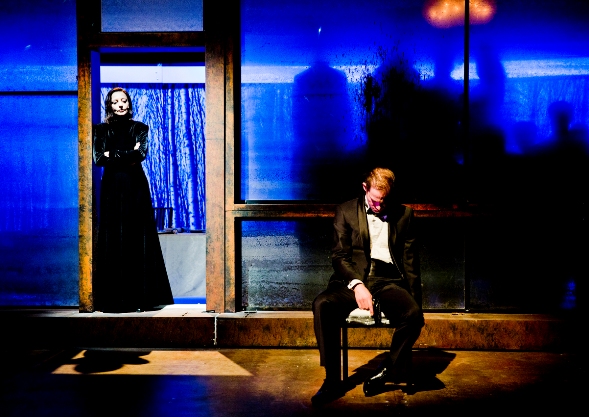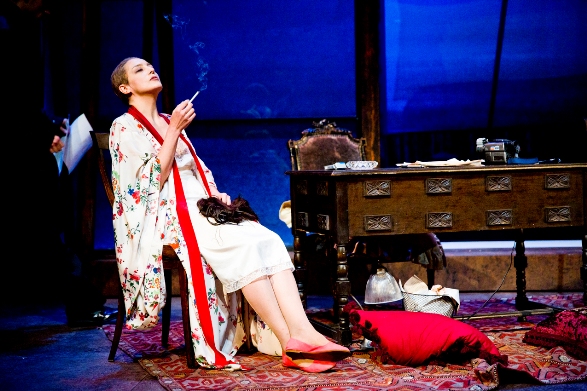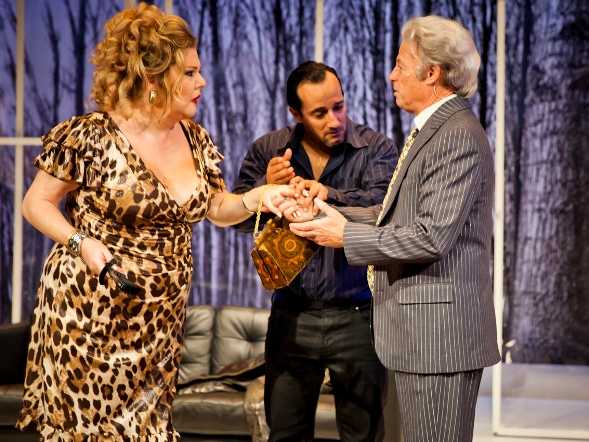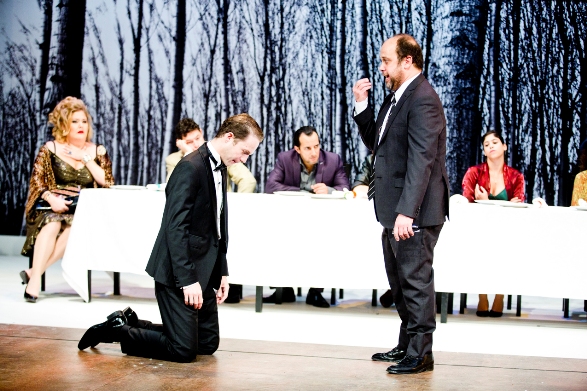
The concept of Chekhov’s gun argues against excess, as expressed by the writer in a letter to fellow playwright Aleksandr Lazarev in 1889: “One must not put a loaded rifle on the stage if no one is thinking of firing it.” One might well view the Cameri Theatre’s production of Ivanov through this prism. Adapted and translated by Arthur Kogan and Itay Tiran, the play is directed by Kogan and features Tiran as the title character Nikolai Ivanov.
Even before a single word is spoken, the first scene reveals so much. Ivanov’s face is hidden, buried beneath a book. Surrounded by beauty, he is asleep on a lawn chair, insensible to it. The sights and sounds of the country, evoked with subtlety by Michael Kramenko’s set design, the gentle notes of Mozart on the piano – he cannot see or hear any of it in the depths of his slumber; just as all that weighs upon him prevents him from taking pleasure in life. What weighs upon Ivanov’s spirit? His woes are easily apparent: he is heavily in debt, and his wife Sara is seriously ill. Yet Chekhov would have us focus on what we cannot see: the inner workings of Ivanov’s heart and mind.

In this, Chekhov’s first play to be produced, one sees a critique of society as well as an investigation of the human soul in the mundane suffering of everyday life. Ivanov may be seen as a Hamlet figure, as mentioned in the play itself, albeit a Hamlet in a Russian comedy rather than Shakespearean tragedy. References to Hamlet abound, and Tiran’s successful sojourn in the Shakespearean role enhances the humor in this parallel. From a medical perspective, and let us not forget that Chekhov was a doctor, one might surmise that Ivanov is suffering from depression. It is around Chekhov’s time that depression began to replace melancholia as the term for the physiological and emotional affective disorder. Yet this knowledge does not render his malady less mysterious, not does it temper its severity.
Yet for Chekhov, Ivanov was intended as a comedy rather than tragedy, and this production certainly invites the audience to experience the absurd comedy of social and individual ailments. Itay Tiran’s Ivanov conveys the anxiety and confusion of an intelligent man well aware of his predicament, yet so exhausted and depleted emotionally that he is not capable of taking action. Consistent with depression, he is intensely focused on himself alone, even as his reason tells him that this is wrong: ” I suppose I am dreadfully guilty, but my thoughts are muddled, my soul is in the grip of a kind of apathy, and I am no longer able to understand myself. I don’t understand myself or other people.” He is too tired to help himself and too self-involved to help others, or to accept the help they offer. Tiran, who has one of the most resonant, mellifluous voices on the Israeli stage, endows Ivanov with a haunting vulnerability.

Helena Yarlova portrays Sara, a Jew who converted and braved her family’s rejection in order to marry Ivanov. Despite her fatal illness, she possesses the vitality and courage that her husband lacks, and Yarlova conveys this with sensuality and elegance. Sarah is attended by Dr. Lvov (Uri Rawitz), a man of strict principles who is not quite so secretly in love with the lady. Rawitz does a fine job as the stiff, stick-in-the-mud Lvov, moved to passion by Sarah.

The social milieu is one of drinkers, moochers, schemers, gamblers, and petty power-mongers for whom money is the ultimate value in life, and back-stabbing gossip is almost an art form. Most lovable and entertaining of the moochers is Count Shabelsky, so delightful and witty in his light-hearted opportunism and played to perfection by Gadi Yagil. A party at the home of Ivanov’s neighbors, the Lebedyevs, provides a panorama of the local characters in all their ridiculous antics. Irit Kaplan is so funny in the role of Zuzushka, the hostess you love to hate, with her plastic covers on the furniture and skimpy fare. Kaplan has such a feel for nuance in her expression and gestures, in this party scene she even makes boredom look hilarious with her small petulant frown, as her hands languidly clap in time to the music.

In this adaptation and translation, the play is set in contemporary times, as reflected in the costumes, accessories and music. Yet this is accomplished with subtlety in text and staging, and feels very natural, as the themes explored are timeless and universal. However, in the balance of comic and tragic, I felt that the second act emphasized the social satire a bit much, and particularly in reference to Chekhov, I would say that less would have been more.
Chekhov’s strength does not lie in his ability to mock the human failings he knows so well, even though he does so with accuracy and panache. The power of Chekov’s plays lies in the way he conveys human vulnerability, engaging our empathy, so that we feel a twinge of pain for even the most pathetic of characters, even as we laugh. Dudu Niv’s excellent portrayal of Lebedyev, the affable drunkard under the tyranny of his formidable wife Zuzushka, is the essence of Chekov. Niv embodies this character completely, watching him melt into soft, smiling, inebriation during the initial party scene is sheer delight. On the surface, there is not much to admire about this character, yet one feels for him, and in his insistence on speaking and taking action – even from that weak vantage point – he is the most courageous of them all.

Ivanov
by Anton Chekhov, Adapted and Translated by Arthur Kogan and Itay Tiran; Directed by Arthur Kogan; Set desigin: Michael Kramenko; Costume design: Moni Mednik; Lighting design: Uri Morag; Assistant to director: Asaf Friedman; Cast: Itay Tiran – Ivanov, Yoav Levi – Misha Borkin; Gadi Yagil – Count Shabelsky, Helena Yaralova – Sara, Uri Rawitz – Dr. Lvov, Irit Kaplan – Zuzushka, Osnat Ben Yehuda – Marfoosha, Dudu Niv – Lebedyev, Dana Meinrath – Sasha, Techia Danon – Avdotya, Simcha Barbiro – Kossych, Gil Weinberg – Dudkin, Tal Weiss – Budkin, Khamis Elshaik – Gavrilla, Barak Fridman – Guest 1, Lion Barzilai – Guest 2.
Future performance dates (some with English subtitles) may be found on the Cameri Theatre website.





